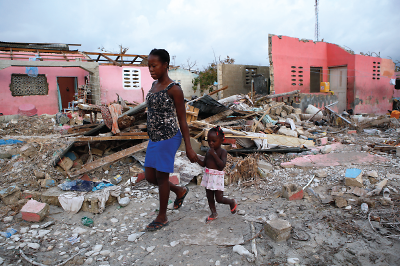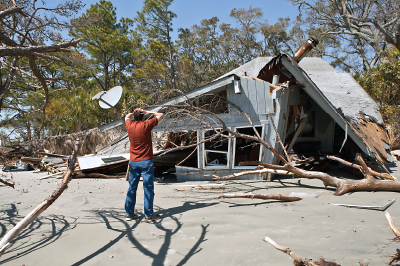Climate Change Said to Carry Serious Mental Health Repercussions
Abstract
Psychiatrists should be alert to the mental health effects of floods, fires, storms, and other natural disasters caused by the rise in global temperatures.
Get ready for the heat, fellow psychiatrists, said speakers at IPS: The Mental Health Services Conference in Washington, D.C., in October—when the weather was still quite warm for autumn.

Residents of Port Salut, Haiti, walk amid the damage and debris in a neighborhood almost completely destroyed by Hurricane Matthew in October. Experts warn that climate change is behind the increase and ferocity of such disasters and carries with it major mental health implications.
Temperature reached a world-record 129.2 degrees Fahrenheit in Kuwait this summer, and the Middle East could become uninhabitable by 2100, said Lise Van Susteren, M.D., of Washington, D.C.
“The situation is worse now, and it may be too late” to prevent catastrophe, she said.
Steadily increasing temperatures have already produced humanitarian crises and their attendant mental health consequences, said Van Susteren. Some experts have suggested that one contributory element to the ongoing humanitarian disaster in Syria may well have been the severe drought that pushed people off their farms and into cities, for instance.
Even single events can cause permanent or temporary mass migration, as happened in New Orleans after Hurricane Katrina.
“Increasing weather variability leads to increased rates of weather disasters,” said Robert Ursano, M.D., a professor and chair of psychiatry at the Uniformed Services University of the Health Sciences (USUHS) in Bethesda, Md.
Those disasters have a disproportionate effect on the disadvantaged and people who live near bodies of water, said Ursano, who is also director of the Center for the Study of Traumatic Stress at USUHS. “They present with significant mental health problems after climate-related disasters.”
Disasters caused by climate change encompass more than floods, said Public Health Service Cmdr. Joshua Morganstein, a psychiatrist and an assistant professor at USUHS. High winds, extreme cold or heat, wildfires, and possibly some earthquakes may be attributable to the effects of increased carbon dioxide in the atmosphere.
“The mental health problems may include anxiety, depression, or PTSD, but more common are increased health risk behaviors like smoking, drinking alcohol, or poor sleep,” said Morganstein.
Typically, the young and elderly, women, first responders, the poor, and those with preexisting psychiatric conditions are among the most vulnerable. Children are often separated from their parents. Not only do the poor face dealing with disaster with fewer resources, but also they may have lived in more vulnerable neighborhoods and houses to begin with.
Anyone, regardless of socioeconomic status, may face the loss of job and home, the need to relocate temporarily or permanently, and the degradation of a support network. First responders may find themselves in dual roles, as both victims and rescuers.
Increased heat alone can affect physical and mental health, evidence suggests. Warmer air both speeds up the production of smog and traps it at ground level, increasing incidence of pulmonary and cardiac diseases. Higher temperatures may induce stress-related impulsivity or aggression, and possibly even suicidality.

Emotional response can swing widely from phase to phase during and after a disaster, said Morganstein. The threat and impact of storm or flood may be replaced by a heroic phase during rescue and a “honeymoon” phase as communities initially come together afterward. Then spirits can decline for a time as devastation becomes clear, then rise as recovery proceeds. “Anniversary reactions” may produce unpleasant reactions in future years.
Dealing with the effects of climate change calls for increased knowledge and skills in disaster mental health, developed in advance of events.
“Early interventions may reduce the impact of a disaster, and education and preparation can reduce distress and enhance response,” said Morganstein. “Information treats anxiety in a crisis.”
People want to know what has happened to them in a disaster but also want to be assured that they and their loved ones will be all right. They also want to know what to do next, he said.
Mental health personnel should work to normalize the likely reactions to disaster, build up social support networks, enhance calming, and optimize sleep.
“A few days of good sleep can do wonders for people under stress,” said Morganstein.
Written and spoken words are important in that process but so are symbols and rituals like memorial services.
More specifically, the mental health response to disaster inevitably requires collaboration, he said. “Distress reactions, health risk behaviors, and psychiatric disorders generally present in primary care or emergency settings first. Psychiatrists should coordinate with primary care clinicians to provide education and consultation for their patients.” ■



